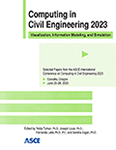Interactive Design by Integrating a Large Pre-Trained Language Model and Building Information Modeling
Publication: Computing in Civil Engineering 2023
ABSTRACT
This study explores the potential of generative artificial intelligence (AI) models, specifically OpenAI’s generative pre-trained transformer (GPT) series, when integrated with building information modeling (BIM) tools as an interactive design assistant for architectural design. The research involves the development and implementation of three key components: (1) BIM2XML, a component that translates BIM data into extensible markup language (XML) format; (2) natural language-based architectural detailing through interaction with AI (NADIA), a component that refines the input design in XML by identifying designer intent, relevant objects, and their attributes, using pre-trained language models; and (3) XML2BIM, a component that converts AI-generated XML data back into a BIM tool. This study validated the proposed approach through a case study involving design detailing, using the GPT series and Revit. Our findings demonstrate the effectiveness of state-of-the-art language models in facilitating dynamic collaboration between architects and AI systems, highlighting the potential for further advancements.
Get full access to this article
View all available purchase options and get full access to this chapter.
REFERENCES
Brown, T., B. Mann, N. Ryder, M. Subbiah, J. D. Kaplan, P. Dhariwal, A. Neelakantan, P. Shyam, G. Sastry, and A. Askell. 2020. “Language models are few-shot learners.” Advances in neural information processing systems, 33: 1877–1901.
Eldin, N. N. 1991. “Management of engineering/design phase.” Journal of Construction Engineering and Management, 117 (1): 163–175. American Society of Civil Engineers.
Elghaish, F., J. K. Chauhan, S. Matarneh, F. Pour Rahimian, and M. R. Hosseini. 2022. “Artificial intelligence-based voice assistant for BIM data management.” Automation in Construction, 140: 104320. https://doi.org/10.1016/j.autcon.2022.104320.
McHugh, M. L. 2012. “Interrater reliability: the kappa statistic.” Biochem Med (Zagreb), 22 (3): 276–282.
OpenAI. 2023. “GPT-4 Technical Report.” arXiv.org. Accessed March 24, 2023. https://arxiv.org/abs/2303.08774v2.
Pan, Y., and L. Zhang. 2022. “Integrating BIM and AI for Smart Construction Management: Current Status and Future Directions.” Arch. Comput. Method Eng. Dordrecht: Springer. https://doi.org/10.1007/s11831-022-09830-8.
Qian, C., R. K. Tan, and W. Ye. 2022. “An adaptive artificial neural network-based generative design method for layout designs.” International Journal of Heat and Mass Transfer, 184: 122313. Elsevier.
Radford, A., K. Narasimhan, T. Salimans, and I. Sutskever. 2018. Improving language understanding by generative pre-training. OpenAI.
Sacks, R., T. Bloch, M. Katz, and R. Yosef. 2019. “Automating design review with artificial intelligence and BIM: State of the art and research framework.” Computing in Civil Engineering 2019: Visualization, Information Modeling, and Simulation, 353–360. American Society of Civil Engineers Reston, VA.
Sacks, R., C. Eastman, G. Lee, and P. Teicholz. 2018. BIM handbook: A guide to building information modeling for owners, designers, engineers, contractors, and facility managers. John Wiley & Sons.
Salehi, H., and R. Burgueño. 2018. “Emerging artificial intelligence methods in structural engineering.” Engineering structures, 171: 170–189. Elsevier.
Won, J., G. Lee, C. Dossick, and J. Messner. 2013. “Where to Focus for Successful Adoption of Building Information Modeling within Organization.” Journal of Construction Engineering and Management, 139 (11): 04013014. American Society of Civil Engineers. https://doi.org/10.1061/(ASCE)CO.1943-7862.0000731.
Wu, S., Q. Shen, Y. Deng, and J. Cheng. 2019. “Natural-language-based intelligent retrieval engine for BIM object database.” Computers in Industry, 108: 73–88. Elsevier.
Information & Authors
Information
Published In
History
Published online: Jan 25, 2024
ASCE Technical Topics:
- Architectural engineering
- Architecture
- Artificial intelligence and machine learning
- Building design
- Building information modeling
- Building management
- Business management
- Case studies
- Computer programming
- Computing in civil engineering
- Decision making
- Decision support systems
- Design (by type)
- Dynamic models
- Engineering fundamentals
- Methodology (by type)
- Models (by type)
- Practice and Profession
- Research and development
- Research methods (by type)
Authors
Metrics & Citations
Metrics
Citations
Download citation
If you have the appropriate software installed, you can download article citation data to the citation manager of your choice. Simply select your manager software from the list below and click Download.
